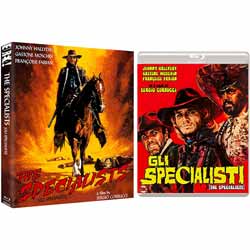|
Click here to return to the main site. Blu-ray Review
French music and film icon Johnny Hallyday is a Clint Eastwood figure riding out of the past into the town of Blackstone. But there the Sergio Leone likeness stops. This is Sergio Corbucci, (Django [1966], The Great Silence [1968]) in full command, Italian auteur much revered by Tarantino and many others. Hallyday is Hud Dixon (Christian name its own rebuttal to Leone worship by honouring Paul Newman’s eponymous, ultimate cynic, neo western, anti-hero from1963) and Hud is here to settle the score for the framing and lynching of his brother over a nebulous bank robbery. The money was never found. Blackstone is a microcosm of not 1869 but 1969. There are hippies, doper hippies who are not into peace and love; the banker, Virginia Pollicut, is a stunning beauty (Fabian), seductive but ruthless; a gangster gang headed by a one armed charismatic killer, El Diablo (Adorf) who shares a past with Hud. The Blackstone sheriff Gideon Ring (Moschin) is an irritatingly idealistic survivor, more politician than policeman. The Sheriff is an ineffectual fool. The lady banker has no hindrance of heart whatsoever because of her gender. Talk about a steel butterfly. Adorf’s El Diablo is a vain, big headed, lethal buffoon with a gang member devoted to writing his biography. Sheba (Fennec) is the only decent person in sight and she loves Hud at first sight. Will it be reciprocated or unrequited? (Again, Pas de spoilers de ma part.) They are all superbly evocative. If this sounds contemporaneously familiar, it is all intentional, special express, from the producer-writer-director’s mind wherein the spaghetti western is a buffet for his twentieth century world view. Blackstone, as Austin Fisher points out in his video essay for this release, is not a standard cowboy movie street set but a desiccated quadrant where all the passions and betrayals play out in the dusty centre stage, the town square, involving everyone. Indeed the ending (no spoilers, I promise) does involve the whole town in a very revealing way, une foule d'ânes nus, unlike anything you’ve ever seen in a western, spaghetti or Hollywood. Hallyday’s Hud, I’m sorry to say is the most monochromatic performance of all and he is continually eclipsed by the vivid ensemble. This may have been Corbucci’s intention as sort of a middle finger to the man with no name. I don’t know but my suspicions persist. Hallyday certainly had a vibrant and fanatically appreciated film career (f.i. Man on the Train 2002) so Corbucci shattering the icon of the lone gunman riding into a story to deliver brutal justice doesn’t seem like a stretch. No icon is sacred here. That is the story and this is Corbucci. One and the same. The Technicolor-Techniscope by cinematographer Dario Di Palma (The Seduction of Mimi) is opulent (thank you, Eureka) with a saturated palette harking back to the glory days of the Hollywood fifties look, specifically James Stewart sagas like Bend of the River (1952) or The Far Country (1955) both mountain westerns impeccably directed by Anthony Mann. Like Mann, Corbucci’s Alpine panoramas emphasize steep grades and slopes. The only level place for both directors is the town and for both the town is never itself on the moral level. In this sense Corbucci is a radical traditionalist. Eureka’s 4K rendering of the 1080p image is immaculate. Its saddlebag of extras brings out hidden nuance for spaghetti western fans and will be interesting for those who aren’t. There is a French and Italian track and a partial (director blessed) English track. I recommend either of the former. Audio commentary is by Alex Cox, himself an auteur (Repo Man 1984) and an enthusiastic, ebullient Corbucci fan. His exclamation of "What are these hippies doing in here?" is a good opener for understanding all things Corbucci. The Austin Fisher observations are good for context and insight into the philosophy and mind of the director and the place of The Specialists among his dozen or more spaghetti oaters. In the luxe limited edition, (first 2000) Corbucci fans will find a booklet with fresh text by genre pathfinder Howard Hughes All said, this is as much about Italian ethos in the '60s and '70s as anything you will find. It all comes to an almost hieratic examination of a godless world populated by psychopathic oligarchs and petty bourgeois bumpkins. A bit of Italian Marxism, reductionist cynicism and just plain pissed off disgust. If you’re a fan of the star, the auteur or the genre, this edition will be a must have for your collection. Se non ti piace Corbucci, potrebbe fregarsene. For the rest of you, that’s just the way it is. 7 John Huff Buy this item online
|
|---|

